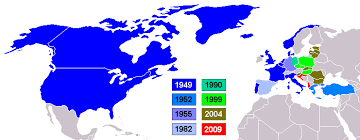
Introduction
The North Atlantic Treaty Organization (NATO) is a military alliance established in 1949, comprised of 31 member countries committed to mutual defence and global security. The importance of NATO countries lies in their collaborative efforts to counteract threats and foster peace, especially in a time of increasing geopolitical tensions. As the world faces emerging security challenges, understanding the role of NATO countries is crucial for both citizens and policymakers alike.
NATO’s Current Membership
NATO currently consists of 31 member states, including notable countries such as the United States, Canada, United Kingdom, France, and Germany, among others. Each country contributes to NATO’s collective defence strategy, which is grounded in the principle that an attack on one is an attack on all. This solidarity has grown increasingly relevant, particularly in light of recent conflicts and crises, including Russia’s aggression in Ukraine.
Recent Developments
In recent months, NATO has taken proactive steps to bolster its security posture in response to regional threats. In July 2023, NATO leaders gathered in Vilnius, Lithuania, to outline new strategies to enhance military readiness and increase troop deployments along the eastern flank. Such measures are aimed at deterring potential aggressors and reassuring member states about their collective security. The alliance’s commitment is reflected in its enhanced Forward Presence (eFP) deployments in Eastern Europe, which serve to strengthen the defence capabilities of member nations bordering Russia.
Significance of NATO Countries
NATO countries play a vital role in maintaining international stability. Their collaboration in military exercises, intelligence sharing, and peacekeeping operations demonstrates a united front against global threats, such as terrorism and cyber attacks. By fostering cooperation amongst diverse nations, NATO not only safeguards its members but also promotes broader security alliances that transcend regional conflicts.
Conclusion
The significance of NATO countries extends beyond military alliances; they represent a commitment to shared democratic values and the principle of collective security. As global challenges evolve, the role of NATO will undoubtedly adapt, but the cohesive strength of its member states will remain a cornerstone of international peace and security. Looking ahead, NATO’s ability to navigate complex geopolitics while maintaining unity will be crucial for its sustained relevance in ensuring global stability.
You may also like

Understanding the Current Political Landscape in the UK

The UKIP Party: Recent Developments and Future Outlook

Boris Johnson: A Look at His Current Political Landscape
SEARCH
LAST NEWS
- Remembering Wendy Richard: The Promise to Co-Star Natalie Cassidy
- How Did Anglian Water Achieve an ‘Essentials’ Rating for Mental Health Accessibility?
- Shai Hope Leads West Indies in T20 World Cup Clash Against South Africa
- What We Know About Weston McKennie: Future at Juventus and Past at Leeds
- What We Know About the Upcoming Live Nation Antitrust Trial